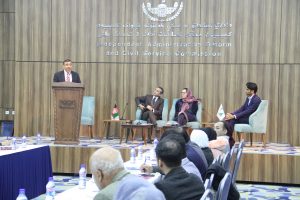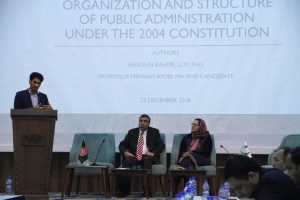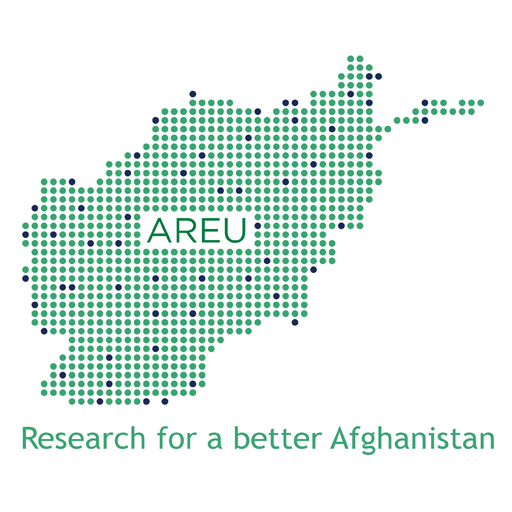
28 Aug Launching event for the report “A Study of Afghanistan’s Organization and Structure of Public Administration under the 2004 Constitutionâ€
On 23 December 2018, the Afghanistan Research and Evaluation Unit (AREU) launched its report “A Study of Afghanistan’s Organization and Structure of Public Administration under the 2004 Constitutionâ€.

Keynote Speakers: Dr Orzala Nemat, AREU Director, Mr Nadir Naderi, IARCSC Chairman, Mr Shahmahmood Miakhel, Country Director of the United State Institute of Peace (USIP) and Dr Haroun Rahimi, presenter and Co-author of the research report.
The event started with a welcoming speech by Dr Orzala Nemat. She thanked Mr Naderi for hosting the event, Mr Shahma
hmood Miakhel, country director of USIP for the generous financial support for the study, and Dr Haroun Rahimi and Mirwais Ayobi for conducting the research.
Introducing AREU and the study, Dr Nemat indicated that in the past 80% of AREU’s research was conducted by international experts, but since 2017, Afghan researchers had conducted 80% of the research. This change started three years back when Mr Naderi was appointed as the first Afghan Director of AREU, and under him, national researchers were encouraged to become more involved in research. Dr Nemat has continued this process under her leadership. She emphasised the need for using and building national capacity for conducting research as well as partnering with international experts in the areas where national capacity is lacking.
She then briefly introduced the research paper. The study falls under one of AREU’s thematic areas (Constitutional Law) and was conducted in three phases. The first phase of the study focused on constitutional reform such as the division of power, the electoral system, and fundamental rights of citizens based on the constitution. The second phase of the study looked at the evolution of the executive branch of the government and judicial review. The third phase of the study focuses on Chapter 8 of the Afghan Constitution (public administrative system), and its research findings are those that were launched today. This research is significant and timely as the government’s administrative reform effort accelerated in 2018. It is our hope that this study will result in a broader discussion at the national level on the administrative reforms agenda as well as to understand the current public administration system, what the constitution says, and what is happening in practice and how to resolve the issues that emerge.
Mr Shahmahmood Miakhel was the second speaker. He supported the study: “Good governance is a pre-requisite of development, security and social justiceâ€. He thanked AREU for its long partnership with USIP on the constitutional and judicial review studies. He further noted that as minimal study had been conducted on the constitution, there was a gap in the literature on the topic in local languages. He remarked that recent research publications by AREU-USIP on the constitution provided valuable literature to the relevant stakeholders including university students and lecturers that could now use the research in their studies on governance issues.
Mr Naderi congratulated both AREU and USIP for the timely research on current administrative challenges. He said, “the research is done in a good time and has highlighted key questions on the topic and provided suitable answers to those questionsâ€. Mr Naderi also noted, “the current constitution was drafted as [a] response [to] historical issue[s].†He added that it was imperative for researchers to focus on the prevailing culture of public administration in the country, and asked a question regarding this matter, “how much is it possible to change the administrative culture in the country?â€
A discussion followed on how decades of war in the country had affected governance, public administration, and the structure of the government. War, he noted, had created distrust among the people of the government. The challenge of building and operating a government under the environment of armed conflict had also led to the centralisation of power at the national as well as at local levels. The other problem highlighted was how public institutions had evaded responsibility, which has resulted in poor service delivery.
 In conclusion, Mr Naderi emphasised the fact that the state and effectiveness of the current administrative system must receive attention. He noted that he was satisfied with the recommendations in the paper and stated that the most crucial point was to create an accountable and responsive administrative culture as well as to build trust both in the institutions themselves and among the people of the institutions.
In conclusion, Mr Naderi emphasised the fact that the state and effectiveness of the current administrative system must receive attention. He noted that he was satisfied with the recommendations in the paper and stated that the most crucial point was to create an accountable and responsive administrative culture as well as to build trust both in the institutions themselves and among the people of the institutions.
After the keynote speakers’ statement, Dr Haroun Rahimi (co-author) presented the research methodology, key findings, and recommendations. In the Q&A session, participants raised questions related to the research findings.
At the end of this event, during open dialogue, following topics emerged as future potential topics for research by AREU:
- Assessment of the judicial role and responsibilities under the constitution
- Structure, recruitment and functions of public administration [as further expansion of current paper on Administration]
- Assessment of policy implementation/ challenges towards implementation of policies
- Independence of the judicial branch under the existing constitution

